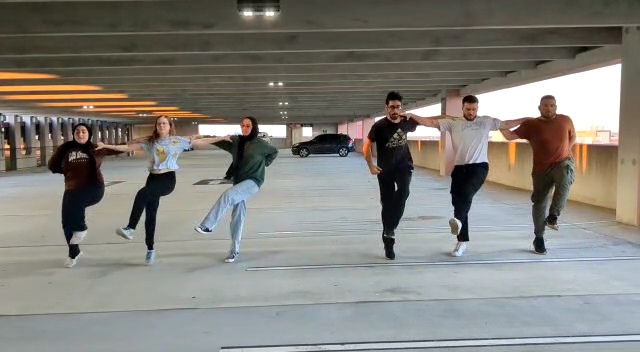Revamped Dabke club introduced at USF

After the Bull’s Dabke club disbanded in spring 2022, Dabke dance club president Claire Fosburgh made it her priority to bring back the club that represented a personal connection to her family’s Syrian-Lebanese culture after settling in the U.S.
“I was raised to have this appreciation for our culture and our food, but my family is very Americanized,” Fosburgh said. “I wanted to connect with my culture in a way that wasn’t really possible for me without speaking Arabic.”
The current Bulls Dabke club has 30 registered members and six fixed performers that attend practice every Wednesday on the seventh floor of the Beard Garage at the Tampa campus, according to Forsburgh. She said the number used to be larger, but with members having other academic priorities, the club lost some dancers.
New members can sign up for practices on BullsConnect or attend practices to join the team.
Dabke, often spelled as Dabka, is a traditional folk dance that originated in Levantin regions of the Middle East such as Jordan, Palestine, Syria and Lebanon, according to Fosburgh. She said most people apply the basic steps while in line at weddings, and once they are seated, performers will use more advanced moves.
“The actual dance is a series of stomps, kicks and jumps,” she said. “Dabke literally means ‘to stomp.’”
The dancing style not only follows the beat of the drums, but “half-steps” are placed following the melody of various types of Dabke music, according to Fosburgh. Although the dancing style is only practiced in some regions of the Middle East, she said the club has seen Moroccan, Syrian, Lebanese and Egyptian dancers.
“Dabke is all about unity,” Fosburgh said. “You are all holding hands, linked, and all doing the same thing. So even people of different religions and backgrounds come together.”
Junior political science major Samir Messahel joined at the beginning of the semester and is currently one of the officers for Bulls Dabke. Being from Egypt, a culture that does not have dancing like Dabke, Messahel said he learned the steps, rhythm and stomps from scratch.
“I never was a dancing person before this, so it did take me out of my comfort zone,” Messahel said.
Messahel said his friends were already aware of Dabke, and due to a certain familiarity between his culture and other Arabic traditions, he wants to ensure he spreads the positivity and unity Dabke dancing can provide to students.
“It is a culture very similar to my own, almost one for one, but we don’t have the same dancing. As an officer, I want people to have the same experience that I do and love it for the same reasons I do,” Messahel said.
The club was fully active and performing with more dancers in fall 2021. However, Fosburgh said due to the last administration’s busy schedule, the club was left behind and eventually shut down. She said the past president helped her re-register the club, which gave her the opportunity to then rewrite the new club’s constitution and mission statement.
Fosburgh said the whole process was easier than she anticipated. With her new leadership position, she said she wanted to ensure that anyone feels comfortable dancing with the Dabke dancers.
She said “gatekeeping culture” is a trend she does not intend to follow, and instead hopes to share her love with all USF students.
“I think everybody should be able to participate so we can share this beautiful gift we have to offer,” Fosburgh said.







